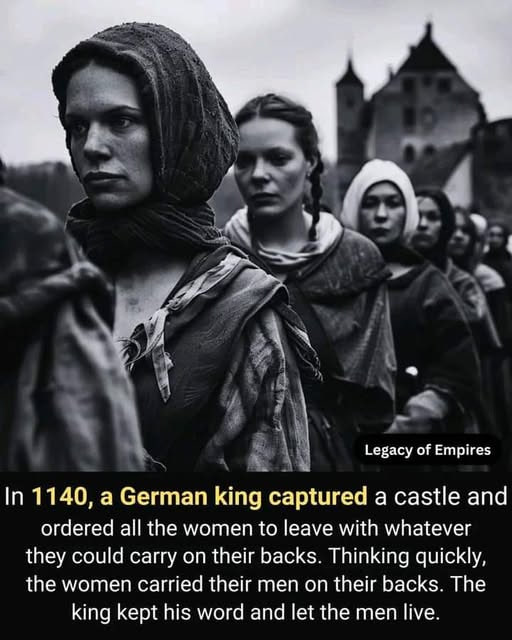In the year 1140, amidst the turbulent power struggle between the Welfs and the Hohenstaufens in the Holy Roman Empire, the Siege of Weinsberg unfolded as a defining moment. While this conflict was marked by bloodshed and betrayal, it also produced a story of loyalty and cleverness that has transcended centuries. The actions of the women of Weinsberg during this siege, and the surprising mercy shown by King Conrad III, offer a powerful glimpse into the human spirit during times of war.
The Conflict: Welfs vs. Hohenstaufens
The siege was part of the larger struggle between the rival factions of the Welfs, supporters of Duke Welf VI, and the Hohenstaufens, led by King Conrad III of Germany. The town of Weinsberg and its castle, loyal to the Welf cause, became a strategic target for Conrad as he sought to weaken his opponents and consolidate his power in the Holy Roman Empire.
Conrad’s forces laid siege to the castle, eventually breaching its defenses after intense fighting. The defenders, led by Duke Welf VI, faced certain defeat. Yet, what could have ended as another chapter of destruction took an unexpected turn that would make history.
The Concession: A Remarkable Offer
Rather than slaughter the inhabitants, Conrad made an unusual concession: the women of the castle were allowed to leave, taking with them whatever they could carry on their backs. Whether this was an act of mercy or a calculated strategy to reduce unnecessary bloodshed, it created an opportunity for an extraordinary display of loyalty and ingenuity.
Women’s Loyalty: The Defining Moment

The women of Weinsberg, confronted with the chance to save only what they could carry, chose not to leave with gold, jewels, or other treasures. Instead, they carried what mattered most—the men of the castle. Hoisting their husbands, brothers, and sons onto their backs, the women walked out of the gates, demonstrating unparalleled resourcefulness and love.
This act left King Conrad III in a moral quandary. Despite having conquered the castle, he had given his word. Moved by the women’s cleverness and loyalty, Conrad chose to honor his promise and spared the lives of the male defenders.
Legacy of Weibertreue (Women’s Loyalty)
The women’s actions during the Siege of Weinsberg became legendary, earning the German term “Weibertreue,” which translates to “Women’s Loyalty.” Their ingenuity not only saved lives but also inspired a legacy of respect for their courage and devotion. The event is commemorated to this day, with the ruins of Weinsberg Castle known as the “Weibertreu Castle.”
A Lesson in Humanity
The Siege of Weinsberg stands out in medieval history not just for its military significance but for the profound human values it revealed. In an era often remembered for brutality and conquest, the women’s loyalty and Conrad’s decision to honor his word remind us of the importance of mercy, cleverness, and moral integrity even in the darkest of times.
A Story for the Ages
The Siege of Weinsberg is more than a tale of conflict; it is a story of love, loyalty, and ingenuity. It serves as a timeless reminder that even amidst war, acts of compassion and cleverness can shine through, leaving an enduring legacy for generations to come.
The ruins of Weinsberg Castle continue to stand as a testament to the courage of the women and the mercy of a king—a powerful symbol of humanity in an age of chaos.
